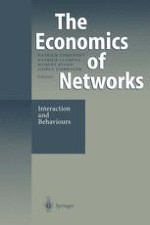1998 | OriginalPaper | Buchkapitel
Rationality and Heterogeneity in Stochastic Aggregation Models
verfasst von : Jean-Michel Dalle
Erschienen in: The Economics of Networks
Verlag: Springer Berlin Heidelberg
Enthalten in: Professional Book Archive
Aktivieren Sie unsere intelligente Suche, um passende Fachinhalte oder Patente zu finden.
Wählen Sie Textabschnitte aus um mit Künstlicher Intelligenz passenden Patente zu finden. powered by
Markieren Sie Textabschnitte, um KI-gestützt weitere passende Inhalte zu finden. powered by
Non-price interactions have recently been proved to be relevant, and sometimes crucial, for economic analysis: these problematics have given birth to a new approach to economic modeling, namely the one which makes use of stochastic aggregation models. The core idea is the one of Schelling, according to which order in collective phenomena has to be interpreted as the consequence of many individual actions. We believe that an important question here is then to develop models compatible with the rationality hypothesis: indeed, if it was not so, then the robustness of the results would be very poor since they would only apply to ants or automata and not to human beings. Many models seem to have in fact fallen in this pit, notably due to approximations in the ways they were presented and to their proximity with the hard sciences from which they actually come. But the question of rationality is a true one, and goes beyong presentation errors, since one should not be satisfied with derivations obtained with nonhuman agents, and since these very derivations are therefore very strongly dependent on the eventuality that at least some individuals would be rational: would the results remain the same if one or two rational individuals were added ?As for the analysis of the question of rationality, it is first of all paradoxically shown that it does not come from taking interactions into account: on the very contrary, the existence of cumulative interactions appears as normal for rational agents. It has much more to do with heterogeneity, first because heterogeneity has often been neglected and all agents have been given too simple decision rules in stochastic aggregation models, and second because rational agents will precisely be led to heterogeneous behaviors by their heterogeneous historically acquired situations. Agents therefore have different and interacting optimization programs: we suggest an alternative methodology for stochastic aggregation models, associated with statistical behavioral functions, and we show that they are then well adapted to the analysis of collective phenomena. Since agents are from now on rational, and sometimes maybe very rational, analytical derivations and simulation results also benefit from increased robustness. As a conclusion, a few key examples of such results are summarized, which all seem to open up quite a few new areas for further research, and notably the core question when and where individual rational actions truly have some influence on collective outcomes: as a matter of fact, and according to stochastic aggregation models with statistical behavioral functions, there might at least sometimes have none.
